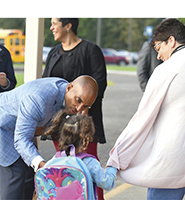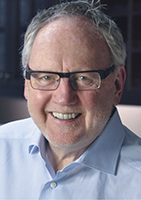
Spirit Work and the Science of Collaboration
An examination of education leaders building faith, hope, trust and love in school communities
BY MICHAEL FULLAN AND MARK EDWARDS/School Administrator, November 2021

|
| As superintendent in Ithaca, N.Y., for the past 10 years, Luvelle Brown has tried to build a supportive environment for students. |
As the principal led her superintendent into the classroom and greeted the 4th-grade teacher and students for an informal observation, the administrators noticed one student with her head folded in her arms on her desk.
The principal asked if she and the superintendent, Susan Enfield, could talk to the little girl. In the context of a friendly conversation, Enfield asked the girl what her favorite things were. “Teriyaki chicken,” she replied.
Enfield attempted to stay in touch with the student, bringing teriyaki chicken from home to share with the girl over lunch one day. When the superintendent asked the principal about the student weeks later, she learned the school had lost touch with her and her family. After much effort, the administrators located the family living in a motel outside the district. Enfield and the principal visited them there, bringing food, supplies — and enough chicken teriyaki for the whole family.
Caring Widely
This is an illustration of what we call “spirit work.” The idea is derived from the Latin spiritus, meaning “breathe life into.” It means caring for ourselves, for others and for the universe. In the true sense, it also means love to leaders in education who seek deeper and more fundamental changes in students’ lives.
Building faith, hope, trust and love in school communities is something Enfield, superintendent of the 18,000-student Highline Public Schools in Burien, Wash., has exhibited throughout her school leadership career.
In Highline, she explains, “We begin everything we do with the Highline Promise that we really know the students and know their strengths and their needs. This is our core value.”
Life-Sustaining Work
Like most educators, we have watched schools struggle to meet the increasingly complex needs of students and to nurture children, teachers, administrators and staff — especially during the chaos of the coronavirus pandemic.
Our experiences and observations over decades of work have led us to a clear understanding that students learn best when learning with other students and that teachers thrive in collaborative cultures. We are convinced that the science of collaboration, the process of working together to achieve fundamental learning and well-being, is the foundation for working in schools.
You cannot succeed in a complex society without partnering with others. Yet this is not ordinary collaboration. It consists of deeper forms of human interaction whereby people learn from and support each other.
Care and Conviction
The two of us have been working with eight school districts across the United States that exemplify the emerging ecosystems of spirit work and the science of collaboration. They are committed to the human values of care and conviction with respect to all their students, and they recognize that focused collaboration is necessary in relation to the daily lives of students and their progression in learning.
 |
| Michael Fullan. PHOTO COURTESY OF MICHAEL FULLAN |
These twin core concepts — spirit work and the science of collaboration — have played out differently in each district, but they have produced common lessons.
The school districts (and their superintendents) are Ithaca, N.Y. (Luvelle Brown); Virginia Beach, Va. (Aaron Spence); Rowan Salisbury, N.C. (Lynn Moody, now retired); Shelby County, Tenn. (Joris Ray);
Jefferson County, Ky. (Marty Pollio); Chula Vista, Calif. (Francisco Escobedo); San Ramon Valley, Calif. (John Malloy); and Highline, Wash. (Susan Enfield).
In times of chaos, humans become anxious, combative and somewhat pessimistic. Some are drawn to higher values — spirit work. Some leaders inevitably rise to the occasion. If such a rise is to become significant, leadership must deliberately cultivate the science of collaboration.
It is only when the two forces, spirit and collaboration, feed on each other that they can grow in tandem. This is what is happening in the districts we studied. These districts may be exceptions in the extreme conditions we currently face, but they can be harbingers of good that could come on a larger scale. Although this is by no means guaranteed, the need is great and positive results based on spirit and collaboration are inevitable on some scale.
In turn, the question becomes whether and how these efforts could become pathways to system transformation.
Ithaca: Cultivating Relationships
Luvelle Brown, superintendent since 2011, says the work in the 5,000-student Ithaca City School District involves all stakeholders: teachers, principals and administrators, parents and community leaders, and most importantly students. “We needed to build trust in each other and that had to start with transparency and a whole lot of listening,” he says.
Brown established a regular presence in schools, classrooms and the community, explaining, “We build trust by spending time together and learning from our conversations with each other.”
So often, the prevailing work for school improvement is centered on test scores and misses the relationships and trust that are key to success for students and teachers. “We didn’t look at this as a project or initiative but as creating the conditions where students would learn best and teachers would thrive with their instructional endeavor,” Brown says.
For example, the schools hung photos of every student in the schools’ hallways to help students feel loved, honored and respect-ed. Teachers also instituted classroom dialogue and actively engage student voice in classrooms.
.jpg) |
| MARK EDWARDS PHOTO COURTESY OF MARK EDWARDS |
Virginia Beach: Working with Intent
Aaron Spence, superintendent of Virginia Beach Schools for seven years, is serious about spirit work and intentional about the science of collaboration.
“Our students need to have a great day, every day. We have to start each day with the sense that ‘We can make it happen today,’” he says.
Morning meetings in the classrooms allow students and teachers to get to know each other and to build belief in one another. “We want our classrooms to be responsive to students,” he says. “We are learning how to build connections, not as some ancillary thing, but as one of the most important things we do. We have to leverage this time to our collective good.”
He adds: “In collaborative cultures, educators plan, teach, assess and reflect constantly. One of the first lessons of collaborative science is that everyone is a teacher and everyone is a student, learning from one other.”
Recognizing that students need to learn with each other, the district built learning spaces that support collaboration and enhance how students and teachers work. The district focuses on deeper learning concepts. Students define their learning goals and their dispositions by listening to and working with one another and by balancing these deeper learning concepts with academic goals.
Spence says the ultimate focus is on students becoming learning leaders, what he describes as “independent learners who manage and design the learning process effectively.”
Memphis: Building Trust
Joris Ray and the Shelby County Schools staff constantly send messages of care and love to students and family “Memphis style.” Tennessee’s largest school district serves a high-poverty student population of more than 110,000.
“It is essential that we pay attention to and understand social and emotional needs of children,” says Ray, superintendent since 2019. “Many of our students come from great adversity and need to be loved first. When students are hurting or live with fear, we must provide the love, care and sense of belonging that may be absent in their lives. We have to show our teachers that we love them and care about them if we want them to love our students.”
Standing strong for students is not easy work. At a public forum about high school athletics last year, Ray announced that the district would not have a sports season due to the pandemic. In the highly emotional and tense atmosphere, Ray said, “I have loved Memphis athletics my whole life, but I love Memphis students more.”
.jpg) |
| Joris Ray, superintendent of Shelby County Schools in Memphis, Tenn., promotes messages of care and love to students who’ve been hurt by the long-running public health crisis. PHOTO BY SHELBY COUNTY SCHOOLS |
Leaders commit to spirit work in different ways. Ray modeled the commitment to focus on the well-being of students and staff above all.
Highline: Keeping Promises
Enfield, Highline’s superintendent for nine years, traverses the extra mile to know the students and families in her district.
“We build trust by showing our leadership dispositions of giving time,” she says. “We have to work at knowing each other. We can’t take it for granted. We have to know all of our employees, know our families and be consistent. Trust is built on consistency. We grow trust by learning together.”
During the pandemic, Highline leaders recognized the need to lift up support staff and bus drivers by holding open forums to listen to, show support for and recognize the importance of the entire school community. Most notably, Highline staff members are com-mitted to ensuring every student has an adult check in on them each week.
Institutional Nurturing
We all feel the weight of the world becoming harsher and more difficult to navigate. Children who are hurting have a much harder time learning and thriving.
Recognizing the immediate need for institutional nurturing and compounding that need with the reality that what we have been doing doesn’t work should bring attention to two guiding principles: (1) refocus on getting ready for life instead of a test; and (2) lead and learn with love and kindness.
As the COVID-19 pandemic stretches on, these school districts are doubling down on their basic cultures and innovating for a very different future — one that embraces the importance of spirit work and collaboration for all.
MICHAEL FULLAN is global leadership director of New Pedagogies for Deep Learning in Toronto, Ontario. Twitter:
@MichaelFullan1.
MARK EDWARDS, a former National Superintendent of the Year, is an education consultant based in Mooresville, N.C. They are co-authors of a new book,
Spirit Work and the Science of Collaboration (Corwin Press).